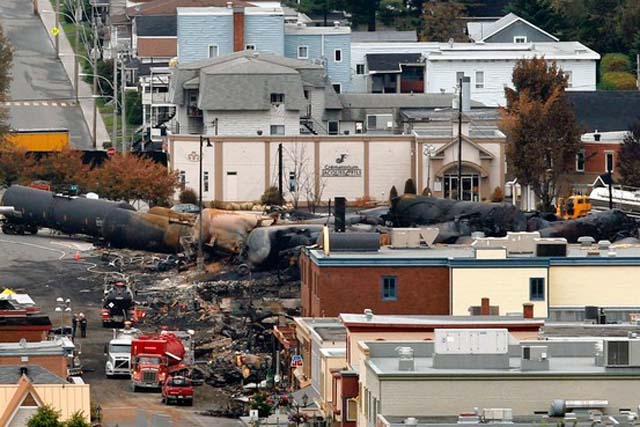

Workers dig at the derailment site in Lake Megantic - Date/Photographer unknown.
11 July 2013 Union Defends Engineer's Safety Record Lake Megantic Quebec - The engineer at the center of questions about what led to the derailment and explosion of a crude-carrying train in Quebec over the weekend was a longtime railroad employee who had what union officials describe as an exemplary safety record.
The engineer's specific actions on Friday night, hours before the derailment, are a key part of the probe by law-enforcement and regulatory authorities. The Transportation Safety Board of Canada said it would review how brakes were set on the train as part of its investigation. Quebec police have said they have met with the engineer and other train company employees as part of their own probe. Police have opened a criminal investigation into the accident.
This week, the owner of the train accused the engineer of not following company procedure for setting the train's brakes. Edward Burkhardt, chairman of Rail World Inc., the parent of the train's operator, Montreal Maine & Atlantic Railway Inc., also accused the engineer of initially misleading the company about how he secured the train in the hours before it started rolling toward Lake Megantic. It derailed there, triggering a series of explosions that decimated a large section of the town.
At a news conference late Thursday, police said they had raised the official death toll to 24. Police have said all told, they believe there are about 50 people missing and presumed dead. Authorities also said they identified the first body, that of a 93-year-old woman.
The United Steelworkers union, which represents 75 MMA workers, said the company is using the engineer as a scapegoat, and defended his safety record over years of service at MMA. The union identified the engineer as Tom Harding, and said he had a "perfect" safety record.
He is "one of the company's best employees," said Guy Farrell, a local spokesman for the union.
A company spokesman denied MMA was using the engineer as a scapegoat.
Mr. Harding, who lives in Farnham, Quebec, couldn't be reached to comment.
Jarod Briggs, a former MMA engineer, described Mr. Harding as "a very good engineer, one of the better on the property." An MMA spokesman said he wasn't aware of any blemish on Mr. Harding's safety record.
Mr. Burkhardt had also previously said he thought the engineer was one of the company's best. In an interview this week, Mr. Burkhardt said one of the first questions he said he asked was, "What kind of guy was the engineer?" after being awakened at 5 a.m. Saturday by a call informing him of the crash. "They said, He's one of our best guys," Mr. Burkhardt said at the time.
Mr. Harding, who union officials said is in his early 50s, has been with MMA since Rail World bought the line in 2003. But he has worked for the railway under its previous owners since 1980, the union's Mr. Farrell said.
The company said the engineer showed bravery after the explosion, which woke him as he slept in a nearby hotel. The engineer borrowed a protective fire suit and after unhooking a pin that connects rail cars used a vehicle to pull nine crude-laden wagons away from the fire, a company spokesman said.
Editor's Note: There is conflicting data as to who actually pulled tank cars from the Lac Megantic fire.
The train's engineer parked the train outside of Lake Megantic late Friday night for a crew swap, heading to a nearby hotel. Later, firefighters were called to extinguish a fire aboard the locomotive. By turning off the locomotive, they disengaged the locomotive's air brake, investigators and the company said.
But that alone shouldn't have resulted in the train running away. Canadian regulation requires an operator to set enough hand brakes to keep a train from moving while stopped, regardless of any air brake. But it leaves the details to individual companies. An appropriate number would depend on the size of the train, its cargo, and the grade of the track.
Typically, operators conduct a "push-pull" test, powering the train forward and backward, to see if brakes hold. MMA said it doesn't know if the train's engineer performed that test.
Also unclear is whether MMA had a brake-setting policy in the first place. Mr. Burkhardt has said it did, but that he didn't know the specifics. The company hasn't disclosed its policy.
Ben Dummett and Carolyn King and Alistair MacDonald.



Vancouver Island
British Columbia
Canada
| 
